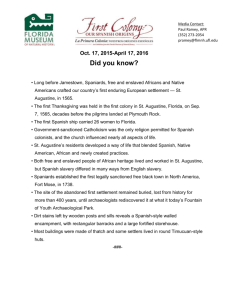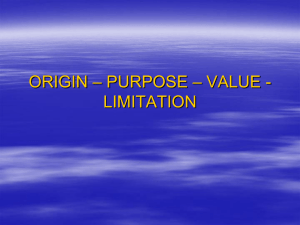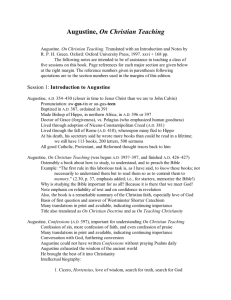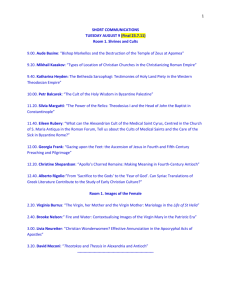Michael Tarala-History Sources and Methods
advertisement
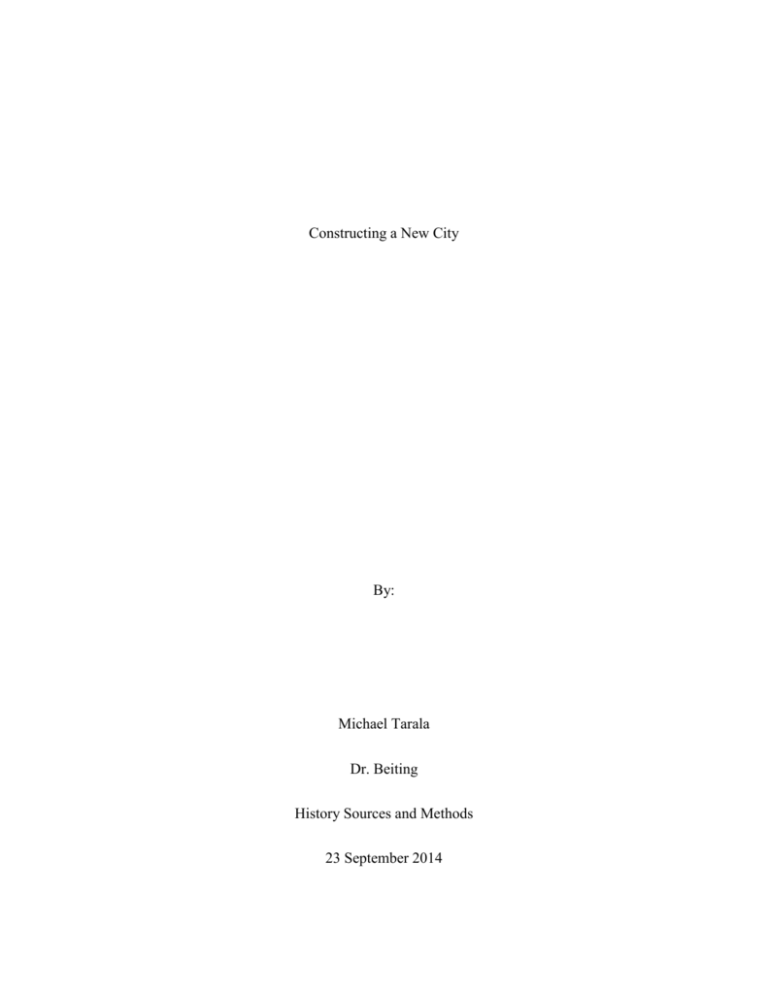
Constructing a New City By: Michael Tarala Dr. Beiting History Sources and Methods 23 September 2014 Tarala 2 Throughout the years, there have been many different people who have given a recount of history and all of them have their own style of doing so. The Greeks were the first to come up with a true style of recording history and those who followed built off of their template. The two main historians in Greek history were Herodotus and Thucydides and their history was very nationalistic and focused mainly on their own culture. As time went on, people started to become intrigued by other societies and cultures and wanted to learn more about them and where they came from. These are called “universal histories” and the Romans perfected this art of recording not only their own history, but that of the other known world. One historian, philosopher, and theologian who most people know about to this day is Augustine. He contributed greatly to the art of history and he did so in a way that was informational and appealing to most people; even to Christians who were not thought of very highly at that time. His father was a pagan but his mother was a strong Christian and many believers today think that she played a main role in his conversion to the Christian Church. He was educated in the Roman ways and he studied the likes of Cicero, Virgil, Terence, and Varro. Although he did grow to become a philosopher, his education in the Greek language and culture was not very good at the start. The Romans were very patriotic and nationalistic so they did not like to admit how similar to Greek culture they actually were. As time went on, Augustine fell into a life of corruption and sin as he struggled with the faith of his mother. He eventually became the pupil of Saint Ambrose, who led him to a life of conversion and prayer. This experience would change not only his life forever, but his works and ideas as well. He created many volumes of works and these range from literary, to Tarala 3 theological, to historical in nature. Throughout all of his works though, he maintains a theme of values and virtue and encourages a moralistic view of history overall. As with most other historians, there is an underlying meaning to Augustine’s writing and recording of history. His idea is to create a new view of history; one which none had ever used before. “He was not concerned with preserving the memory of events, as was Herodotus. Nor did he see history as offering lessons for statesmen, as did Thucydides and Polybius. He did not seek to explain or to describe the greatness of Rome, as did Livy, or to recount her decline from republican virtue, as did Tacitus.”1 All of these people were great historians at one point in time, but he did not agree with any of them. For centuries, people had found these historians to be almost mythological or even divine in a sense, but Augustine makes a bold move to blaze his own trail into the wilderness that is our past and what can be our future if we proceed to do as he says. Before most of these historians and philosophers were even alive, Plato had the belief and the idea of an ideal city. Plato’s ideal city has four virtues that must be upheld in order for it to be ideal. These virtues are: wisdom, moderation, courage, and justice. Although Plato’s full view of his ideal city is unrealistic to a point, Augustine used this Platonic model and formed it differently to make it his own. He believed that there exists two historical worlds; that of the “City of God” and the “City of Man.” Both of these cities are different, but related. The city of man is one that is ruled by kings who say that their power is “given by God,” which is dangerous and the people fall into corruption and falsity. The city of God is one which is eternal and Augustine, “The City of God,” in Historians at Work I ed. Peter Gay and Gerald Cavanaugh (New York: Harper and Row, 1972), 270. 1 Tarala 4 incorruptible, where God rules over the people in justice and the people live together in spiritual and moral unity. “With Augustine, history became a specifically Christian drama and all of the subjects historians previously deemed significant—the Persian Wars, the founding and expansion of Rome—paled into insignificance beside the truly great events in the history of humanity—the fall of Adam, the Incarnation, the Resurrection, the promise of the Second Coming.”2 These are all topics which no historian had ever tried to express before. He did it in a way that was convincing and even brought some to conversion. Christians were not looked at in a good light in most of the world and Augustine’s works gave the Christians something to read and see hope for the future. Augustine used the classical works of past historians to learn what had come before him, but as all students must do, he chose what he believed to be true. His approach, unlike most who came before him, was unique and bold, and it opened the eyes of many people to the new and coming Christian world. The times were changing, and many people either were naïve of the fact, or just did not want to believe the fact that a new way of thinking was approaching from the East. It was a Christian wave of thought and belief, which would take the world by storm before they knew it. Augustine was one of the leaders of this movement and many believe that he was one of the best at bringing this faith to people who had not experienced it before he had written about it. Augustine, “The City of God,” in Historians at Work I ed. Peter Gay and Gerald Cavanaugh (New York: Harper and Row, 1972), 270. 2 Tarala 5 Although Augustine’s works are some of the best of his time, many people do not believe that it is a good adaptation of “history.” He does not have many sources, other than the Bible and Plato and a few others. This is what many scholars believe to be his downfall. They think that he is writing just about divine providence, which is something that’s unable to be proven. But this is why I think his way of writing history is a good way. I believe that history is not a science, but an art. It is not something that one can enter in an equation and get an answer or an outcome. History changes. People change. I do know that history can show us ways in which we can improve and limit our mistakes, but I think that there is not one set way of recording history. Some ways are better than others, mind you, but there is not a specific template that all historians must follow in order to make it a good history. This may sound like I am making a case for relativism, which I am not. There is still truth to be found in history, but the way people go about finding and expressing that truth can vary from historian to historian. Finding that truth must be the reason for all historians to look into the past and record history. I think that Augustine looked in the right places and since I’m a Christian as well as a young historian, I think his history is a good one because it combines the two things that I am passionate about and in a way that speaks to all people.




